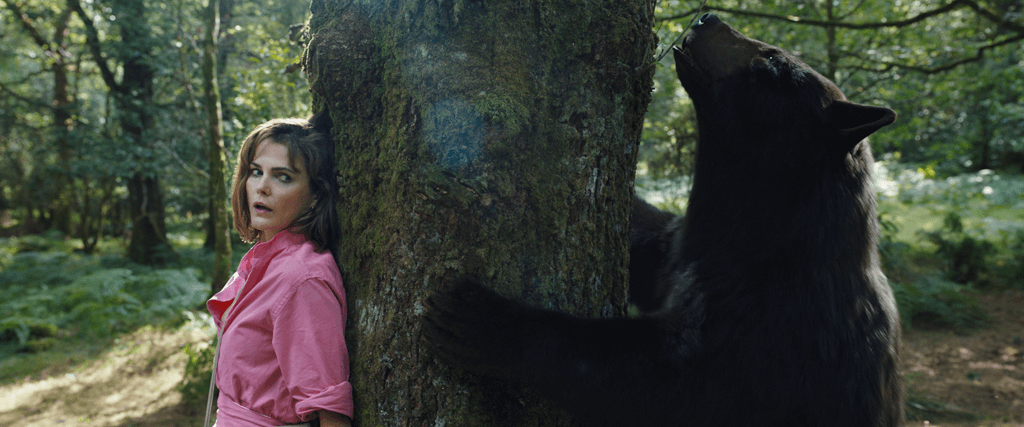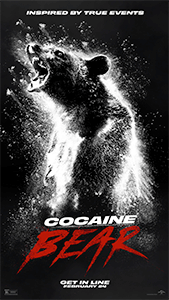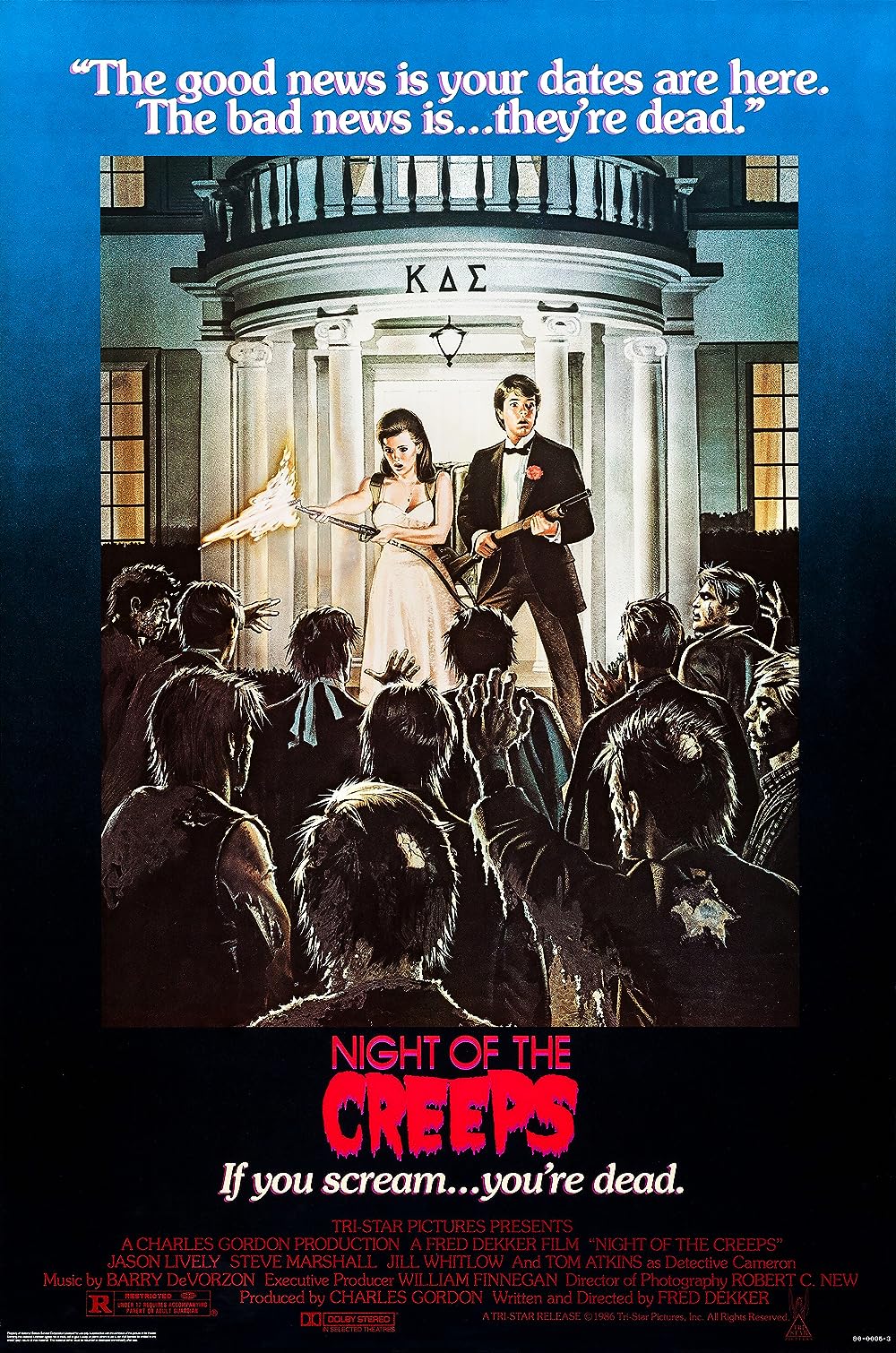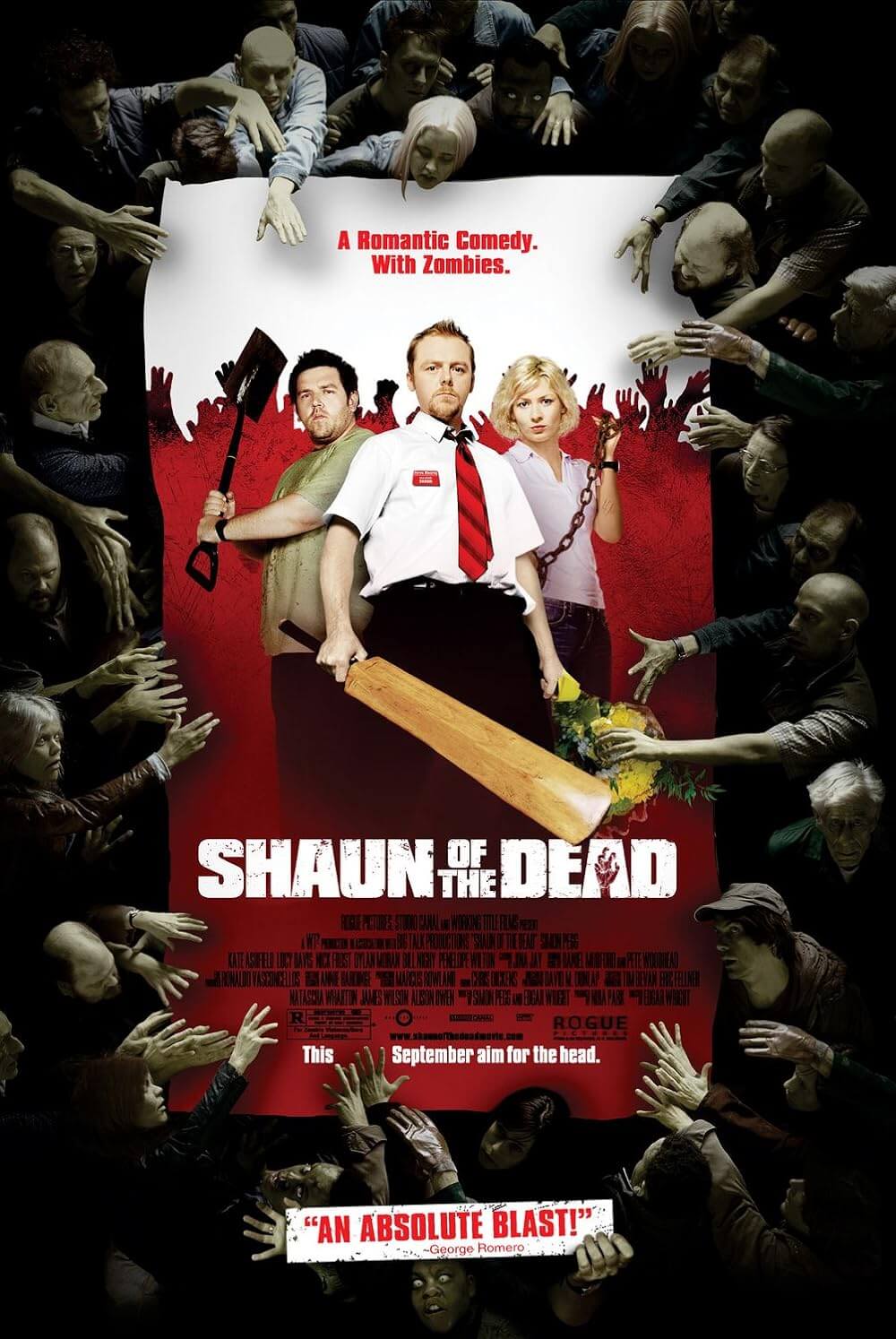
Cocaine Bear
By Brian Eggert |
Although its trailer went viral, Cocaine Bear is a better marketing campaign than a movie. When audiences complain that “All the best scenes were in the trailer,” they’re talking about movies like this. Elizabeth Banks directs a comic when-animals-attack yarn, following the mauly antics of a black bear that stumbles upon some lost kilos of cocaine, only to go on a killing spree in the Chattahoochee National Forest. Scenes of the unconvincing CGI bear tweaking on nose candy prove amusing if you haven’t already seen them in the trailers. And the impressive ensemble, playing dim-witted locals and hikers who get chomped to gory bits, seems to be having fun. Banks continues to show her range from the second and third Pitch Perfect sequels to 2019’s Charlie’s Angels, attempting a horror-comedy that’s aware of its silly premise and embraces it—similar to what M3GAN accomplished earlier this year. Making a movie that balances irony and earnestness is tricky, and Banks doesn’t quite succeed. It’s a promising idea that will undoubtedly spark some interest from genre enthusiasts, but the movie doesn’t lean far enough into its outlandishness for this critic’s taste.
The funniest gag appears early when titles claim, “Based on a True Story.” If you believe that one, then the movie will tell you another. A second set of titles informs that, should a black bear confront you, you shouldn’t play dead as you might with a grizzly; you should fight back. But its source, hilariously credited as Wikipedia, has all the validity of the movie’s claim to truth. To be sure, the real-life story ends after the first five minutes of Cocaine Bear, where a convicted drug smuggler, Andrew Thornton, was found dead in Knoxville, TN, in September 1985. Played briefly by Matthew Rhys, the real Thornton had been piloting over 300 pounds of cocaine across the border. His cargo proved too heavy, so he tried to offload some and fell to his death. A bear found the kilos of white powder, ingested too much, and died. The same bear is supposedly on display at the Kentucky for Kentucky Fun Mall. No coke-addled rampage ensued like the one depicted in the movie.
Banks embraces Cocaine Bear’s ridiculous setup with the same gleeful defiance of reality as last year’s “Weird Al” Yankovich biopic. Screenwriter Jimmy Warden uses the true story to springboard into a B-movie extravaganza. Here, various parties enter the forest, only to find themselves confronted by the twitchy and enraged bear, who’s quick to tear anyone to shreds. Keri Russell plays Sari, a single mother whose rebellious daughter Dee Dee (Brooklynn Prince) ditches school with her friend Henry (Christian Convery) for a jaunt in the woods, and she goes looking for them. Margo Martindale appears as a trigger-happy park ranger who guides Sari and an animal rights activist (Jesse Tyler Ferguson) on a park tour. Elsewhere, two low-level criminals, Daveed (O’Shea Jackson Jr.) and Eddie (Alden Ehrenreich), follow orders from their embittered boss (Ray Liotta, in one of his final roles) and head into the woods to find the loot. A dog-loving detective (Isiah Whitlock Jr.) tries to stop them. Later, a local teen gang and a pair of EMTs enter the victim pool.
Cocaine Bear recalls Piranha 3D’s agenda, where the filmmakers allow us to laugh at and with the movie. Aside from a few moments where the extreme gore might cause a shocked guffaw—such as a Coen-brothers-level mishap with an accidental headshot—most of the violence is played for laughs. When the bear snorts coke from her victim’s dismembered leg, the gag proves too funny to be scary. The comically accented bloodletting reminds us that Banks starred in James Gunn’s Slither (2006) and probably learned a thing or two from Gunn’s brand of macabre humor. Banks also seems to delight in the nostalgic 1980s setting, complete with occasional jabs at Reagan-era anti-drug campaigns and a playful pop soundtrack—including songs by Jefferson Starship, Berlin, and Grand Master Melle Mel. But haven’t the ’80s been mined enough in today’s entertainment? At least in this context, they have.
Unfortunately, the movie’s bloody and self-aware silliness lasts only until the second act. By the last twenty minutes, Cocaine Bear takes its goofy characters too seriously, and somewhere amid the ungainly tonal shifts, the proceedings lose their momentum and the viewer’s interest. Warden’s script becomes sentimental in obvious ways, relying on a string of banal narrative callbacks to grant the characters resolution. But does anyone care about Sari dating a coworker, Eddie’s broken heart, or Daveed’s game of Twenty Questions? The actors do what they can with their presence, but the story touches amount to Screenwriting 101 inclusions that create the false illusion of character development. When the movie stops having fun and pretends like the actors inhabit anything but broad tropes, the proceedings become obvious and overserious compared to the earlier outlandishness. Clunky and less off-the-wall than it wants to be, Cocaine Bear works better as a concept than a movie.

Thank You for Supporting Independent Film Criticism
If the work on DFR has added something meaningful to your love of movies, please consider supporting it.
Here are a few ways to show your support: make a one-time donation, join DFR’s Patreon for access to exclusive writing, or show your support in other ways.
Your contribution helps keep this site running independently. However you choose to support the site, please know that it’s appreciated.
Thank you for reading, and for making this work possible.
Brian Eggert | Critic, Founder
Deep Focus Review







